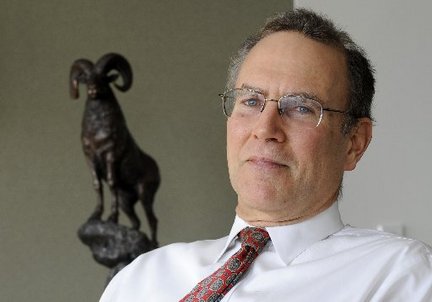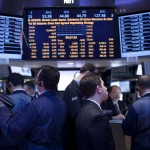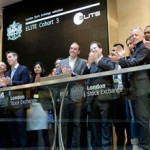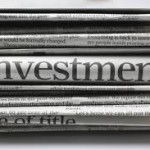T. Rowe Price CEO: Investors are focused on valuations

The chief executive of T. Rowe Price Group Inc. says the firm’s long-term perspective and culture are what make up its secret sauce for success.
The money manager TROW +0.02% on Thursday reported another strong quarter amid higher fee revenue and the sale of some investments. Its first-quarter earnings rose 25% to $304.3 million, or $1.12 per share, compared to $241.9 million, or 91 cents a share from the same period a year ago.
Revenue climbed 17% to $954.6 million, from $815.7 million the year before. Analysts expected earnings of $1.03 per share on revenue of $951 million, according to FactSet.
T. Rowe Price reported net cash inflows from investors of $8.8 billion, lifting assets under management to a record $711.4 billion at the end of the first quarter, up from $617.4 billion in the same quarter a year earlier.
Mutual-funds inflows totaled $8.4 billion, while net inflows into portfolios aimed at institutional investors was $400 million. It was the first positive inflow from institutional investors in eight quarters.
The share price is up more than 2% in midday trading.
T. Rowe’s investment performance stands out, say analysts. The firm reported 78% of its mutual funds across their share classes outperformed their comparable Lipper averages on a total return basis for the three-year period ending in the first quarter.
“The investment performance is a key difference. The consistency over time has been their hallmark and allowed them to grow in the long-term,” said Daniel T. Fannon, analyst at Jefferies.
The firm also notes its stock, bond, and blended asset funds ended the quarter with an overall rating of four or five stars from Morningstar and account for 81% of the firm’s rated funds’ assets under management.
CEO James A. C. Kennedy spoke to MarketWatch about investors and his outlook for the economy.
MarketWatch: Inflows into your mutual funds have been quite strong. The first quarter tends to be seasonably better. Can you explain what is happening with investors?
Kennedy: On the mutual fund side, we are generally seeing higher consumer confidence out there. Therefore people are thinking longer term and how are they invested. We have seen investors pulling out of money-market funds and putting into portfolios, primarily equities.
For institutional investors generally speaking, they are much better funded today than they have been in the past. There has been a lot of movement within asset allocations. Our sales have been strong.
MarketWatch: Can you talk about how the Federal Reserve’s easy monetary policy is impacting the business?
Kennedy: The easy monetary policy has hurt savers and hurt people who have too much debt. You have seen corporations pay down a lot of debt and you are seeing people willing to spend more. But you have hurt people who have done the right thing. So when that reverses — rates will rise will rise over time — that will be O.K. for long-term investors.
MarketWatch: You’ve had some turnover recently. Three of your portfolio managers have left in the last two years. One of your very successful portfolio managers, Rob Bartolo, resigned recently, and he was managing the firm’s $50 billion Growth Stock Fund. How have flows done since his departure?
Kennedy: We have not seen flow change. When you run a big mutual-fund portfolio, people are not investing in the Rob Bartolo fund. We are sorry to see him leave. We had a portfolio manager from large caps [Joe Fath] move over and it’s been a seamless transition. And we only saw one investor redeem and that’s because they have a clause that if a portfolio manager changes, they exit the fund. With the vast majority of institutions, there have been no changes. It shows we have depths in our teams.
MarketWatch: You have expanded your product base from 5 to 30 portfolios outside the U.S.. How is that going? Are you spending more on distribution?
Kennedy: We have been working outside the U.S. for a couple of decades since we started a joint venture with Robert Fleming. We bought out the Fleming piece [in 2000] and can now market outside the U.S. We could actually hire sales people and have them sell outside the U.S. Meanwhile, we continue to build our research team.
We have more equity analysts outside the U.S. than we have in the U.S., and both have fixed-income and equities expertise. It takes time to build teams and it’s going well.
London is the biggest in terms of investment office and then Hong Kong , Toyko, and Sydney. Spend on distribution is going up, but our expertise is going up. So we have been building distribution capital all along.
MarketWatch: What are you seeing investors trending toward?
Kennedy: We have some investors moving into growth, but we are seeing more of a move into value than in growth. You think about 2008 and 2009 and the shock to the system – and way too much debt in the system. Now corporations continue to pay down debt. The fiscal challenges that have been in front of the U.S. and Europe have been absorbed now. You still have regulatory challenges that continue to hold some industries back, but the economy is doing just fine.
And people are more comfortable and valuations have increased in the last couple of years. Growth in the markets will be higher. Interest rates will rise, which will be a headwind. But there are opportunities still in high-yield exposure, in fixed income as well equities.
MarketWatch: You’ve been good performers forever. What is your secret sauce and why is it sustainable?
Kennedy: We don’t focus on quarters, we focus on the long term. We have a strong balance sheet so we can keep investing in our people and technology. What is really important is culture. Our people are collaborating and really helping each other. So I would say it’s the long-term perspective and our culture.
Source: marketwatch





























